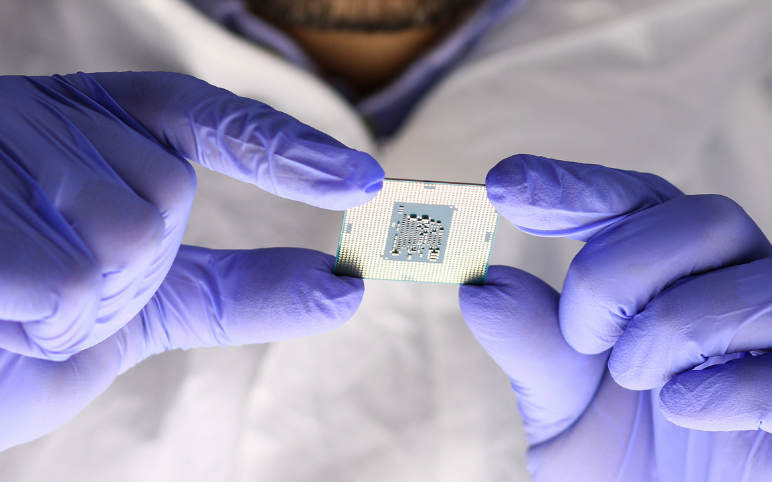From Lab to Market: Understanding the Evolutionary Journey and Market Landscape of Biochips
Apr 17, 2024
Table of Contents
Biochips have emerged as indispensable tools in the healthcare sector, revolutionizing the way diseases are diagnosed, monitored, and treated. These miniature laboratories on a chip offer unparalleled efficiency, sensitivity, and speed in analyzing biological samples, making them invaluable in various medical applications. Their ability to simultaneously process multiple biomolecular interactions with high throughput has significantly enhanced diagnostic accuracy and therapeutic effectiveness, thereby improving patient outcomes and reducing healthcare costs. The growing benefits and importance of Biochips are evident in their ability to facilitate rapid and accurate disease diagnosis, personalized medicine, drug discovery, and monitoring of treatment responses. By providing real-time data and insights into molecular processes at the cellular level, Biochips empower healthcare professionals to make informed decisions, tailor treatments to individual patients, and intervene early in disease progression, leading to better outcomes and improved patient care.
The Biochips market has experienced remarkable growth owing to increasing demand for advanced diagnostic technologies, rising prevalence of chronic diseases, and growing investments in biomedical research and development. Technological innovation and research have played a pivotal role in driving the evolution of Biochips, enabling the development of more sophisticated platforms with enhanced capabilities for biomarker discovery, genomic analysis, and point-of-care testing.
Downloads
Article in PDF
Recent Articles
- The Protein Chip: Revolutionizing Protein Analysis and Discovery
- Digital Twin Technology – Assessing the Growing Role and Its Evolving Applications in Healt...
- Biochips: An Evolving Technology Driving the Future of Healthcare Market
- Biochips in Healthcare: 8 Groundbreaking Applications Shaping the Industry
- Navigating the Vital Role of Bioinformatics in Biological Processes and Medicine
Similarly, companies in the sector are actively involved in advancing Biochip technology through research collaborations, strategic partnerships, and product development initiatives. The growing competition among industry players has led to continuous innovation, cost optimization, and the introduction of novel applications, further fueling market expansion and adoption of Biochips in diverse healthcare settings. As Biochips continue to evolve and become more accessible, they hold immense potential to transform healthcare delivery, improve patient outcomes, and drive innovation in personalized medicine and precision healthcare.
Major Types of Biochips in the Market
Biochips come in various forms, each tailored to specific biological applications. DNA Chips, Protein Chips, Lab-On-Chips, are among the major types of Biochips in the Market.
DNA chips, also known as microarrays, are designed to analyze gene expression levels, detect mutations, and study genetic variations. They play a crucial role in genomics research, personalized medicine, and forensic analysis, offering insights into disease mechanisms and drug responses. Protein chips enable high-throughput screening of protein-protein interactions, protein expression patterns, and post-translational modifications, facilitating proteomics studies and drug discovery efforts.
While, Lab-on-chips integrate multiple laboratory functions onto a single platform, enabling rapid sample preparation, analysis, and detection of biomolecules. As per DelveInsight’s assessment, within the Biochips market, the lab-on-chips segment is poised to seize a considerable revenue in the upcoming years owing to its array of characteristics and advantages, coupled with the increasing adoption of personalized medicine and the growing accessibility of lab-on-chip technology. Lab-on-a-chips represent a class of Biochips comprising microfluidic devices that conduct diverse laboratory functions and fluid analyses at accelerated rates. These chips are engineered with micro-channels smaller than a single cell, boasting a remarkable surface-area-to-volume ratio, facilitating laminar flow pathways for liquids.
Lab-on-a-chip technology exhibits exceptional precision, enabling the manipulation of cells at the single-cell level within seconds. Its applications span a wide spectrum, including micro patch clamp techniques, the regulation of stem cell differentiation, rapid flow cytometry, and efficient cell sorting methodologies. Moreover, recent endeavors in research have increasingly explored the integration of lab-on-a-chip microfluidics with highly parallelized microchemical reactors, promising further advancements in various fields such as drug discovery, diagnostics, and biotechnology.
Similarly, other types of Biochips include cell chips for studying cellular behavior, tissue chips for modeling human organs, and organ-on-chip systems for drug toxicity testing and disease modeling. Together, these Biochips hold the potential to revolutionize biomedical research, clinical diagnostics, and pharmaceutical development by providing efficient and cost-effective solutions.
Biochips Market Drivers
The escalating prevalence of both chronic and infectious diseases is anticipated to fuel the demand for Biochips in the foreseeable future. Chronic diseases (CDs) have emerged as the predominant contributors to disability and morbidity on a global scale. Given the persistent nature of these ailments, addressing them effectively necessitates not only proficient healthcare professionals but also access to cutting-edge treatment modalities. As the burden of chronic diseases continues to rise, there is an increasing imperative for timely and precise diagnostics, personalized therapeutic interventions, and continuous monitoring of disease progression.
Biochips, with their multifaceted capabilities in biomarker detection, genetic analysis, and molecular profiling, are poised to play a pivotal role in meeting these evolving healthcare needs. Their potential to enable rapid, accurate, and multiplexed analysis of biological samples holds promise for enhancing disease detection, prognostication, and therapeutic decision-making. Consequently, the adoption of Biochips is expected to surge as healthcare systems worldwide strive to address the challenges posed by the growing burden of chronic and infectious diseases.
In light of this trend, there is a burgeoning focus on advancing research aimed at creating innovative lab-on-a-chip-based point-of-care (POC) systems tailored for the diagnosis of chronic diseases. This burgeoning area of research underscores the pressing need to address the rising incidence of chronic ailments effectively. As chronic diseases continue to exert a significant burden on healthcare systems globally, the development of novel POC solutions utilizing lab-on-a-chip technology holds considerable promise for driving market growth in this field. These innovative systems are poised to revolutionize disease diagnosis by offering rapid, accurate, and portable diagnostic capabilities, thereby enhancing patient care and management strategies for chronic conditions. Consequently, the anticipated surge in demand for such advanced diagnostic tools underscores the pivotal role that lab-on-a-chip-based POC systems are set to play in shaping the trajectory of the studied market.
Furthermore, the utilization of Biochips in biomedical and biotechnological research is experiencing a significant surge, particularly within the realms of proteomics and genomics. Proteomics, in particular, has emerged as a pivotal tool in the domains of drug development and biomarker identification. Notably, protein Biochips offer distinct advantages, notably their propensity for miniaturization, which translates to reduced sample consumption and enhanced efficiency. This trend underscores the growing importance of Biochips in facilitating high-throughput analyses and accelerating the pace of discovery in these critical research areas. As such, the application of Biochips is poised to continue expanding its footprint within biomedical and biotechnological endeavors, driving further innovation and breakthroughs in proteomics, genomics, and beyond.
Furthermore, the recent surge in product development initiatives within the Biochips market is anticipated to catalyze the demand for Biochips in the years ahead. These concerted efforts in product innovation underscore the industry’s commitment to addressing evolving healthcare needs and advancing technological capabilities. As companies continue to invest in research and development endeavors, they are poised to unveil novel Biochip platforms boasting enhanced performance, versatility, and applicability across various sectors. This wave of innovation is set to unlock new opportunities for Biochips, driving their adoption across diverse fields, including diagnostics, drug discovery, and personalized medicine. Consequently, the momentum generated by these product development activities is expected to propel the Biochips market forward, positioning it as a cornerstone of cutting-edge biomedical research and clinical practice.
Biochips Market Barriers
The Biochips market is set to witness substantial growth, however, it is crucial to acknowledge the potential impediments posed by factors such as the presence of alternative technologies and constraints inherent in lab-on-chip devices. These factors, among others, could pose challenges and potentially limit the overall market expansion. The existence of alternative technologies may introduce competition and necessitate differentiation strategies to maintain market share. Additionally, constraints associated with lab-on-chip devices, such as scalability issues or limitations in sample throughput, may require ongoing innovation and investment to overcome.
Despite these challenges, proactive measures, including continuous technological advancements, strategic partnerships, and targeted R&D efforts, can help mitigate these constraints and unlock new opportunities for growth within the Biochips market. Therefore, while acknowledging potential limitations, proactive strategies and industry collaborations can position the Biochips market for sustained growth and innovation in the coming years.
Growing Role of MedTech and HealthTech Companies in the Biochip Market
Companies play a pivotal role in propelling the Biochips market forward through their investments, collaborations, research and development (R&D) activities, product launches, and regulatory approvals. Major players in the industry such as Abbott, Agilent Technologies, Inc., Bio-Merieux SA, Bio-Rad Laboratories, Inc., Cepheid Inc., F. Hoffmann La-Roche, Fluidigm Corporation, GE Healthcare, Illumina, Inc., LI-COR, Inc., PerkinElmer Inc., Qiagen, Randox Laboratories Ltd, Standard BioTools, Thermo Fisher Scientific, Inc., among others have allocated substantial resources towards R&D efforts to enhance existing technologies and develop innovative solutions to address emerging challenges in healthcare and life sciences. These investments fuel the discovery of new biomarkers, improvement of assay performance, and miniaturization of Biochip platforms, thereby expanding the market reach and enabling broader applications in diagnostics, personalized medicine, and drug discovery.

Additionally, companies are frequently engaged in strategic partnerships and acquisitions to bolster their product portfolios, gain access to novel technologies, and expand their market presence. Timely product launches coupled with regulatory approvals enable companies to commercialize their innovations, penetrate new markets, and capitalize on emerging opportunities.
Furthermore, the Biochips market is witnessing a surge in the emergence of startups leveraging cutting-edge technologies and disruptive business models. These startups often bring fresh perspectives, agility, and entrepreneurial spirit to the industry, driving innovation and challenging incumbents. With a focus on niche applications, novel platforms, or differentiated approaches, these startups contribute to the diversity and dynamism of the Biochips ecosystem, pushing the boundaries of what is possible in molecular diagnostics, precision medicine, and biomedical research. As they continue to attract investment, forge partnerships, and bring innovative solutions to market, startups play an increasingly influential role in shaping the future of the Biochips industry.
Recent Developmental Activities In The Biochips Market
- In July 2023, Opteev Technologies, Inc., a pioneering technology company at the forefront of diagnostics, filed a patent for a revolutionary multiplex Biochip, Opteev for respiratory infection diagnostics. The groundbreaking polymer-based Biochip offered the potential to test multiple pathogens responsible for respiratory infections, including SARS-CoV-2, RSV, and Influenza, and precisely identify the specific virus or bacteria in under 1 minute.
- In June 2023, ACRO Biosystems, under its Aneuro brand, announced the launch of in vivo electrophysiology solutions for neuroscience research with Diagnostic Biochips. Together, the two companies are committed to a collaborative effort to accelerate neurological drug discovery and commercialization.
- In September 2022, Illumina Inc. launched the NovaSeq X Series, enabling faster and more powerful sustainable sequencing. The revolutionary new technology, NovaSeq X Plus could generate 20,000+ whole genomes per year, therefore accelerating genomic discovery and clinical insights to transform patient lives. Thus, such collaborative developments in the region are driving the growth of the Biochips market in the region.
- In February 2022, Onera Health launched the Onera Biomedical-Lab-on-Chip, an ultra-low-power bio-signal sensor subsystem for wearable devices; designed to process multiple bio-signals.
- In January 2022, researchers from the Universidad Carlos III de Madrid (UC3M) and other organizations innovated a new Biochip device made of biocompatible and micro-machined adhesive vinyl sheets, that simplified the process of manufacturing in vitro skin in the laboratory and other complex multi-layer tissues. Human skin modeled using this device could be used in medicine and cosmetic testing, which would reduce the cost of preclinical trials.
- In April 2019, Qurin Diagnostics B.V. and Lionix International B.V. acquired Surfix B.V., which is a supplier of custom-made nanocoatings, complementary to the products and services offered by Qurin and LioniX International. The companies planned on working together closely on early cancer detection using a sensitive Biochip, bringing together their respective complementary technologies.
Evolving Biochips Market – Future Analysis and Key Perspectives
Biochips are poised to play a pivotal role in revolutionizing the healthcare market by offering transformative solutions for disease diagnosis, treatment monitoring, and personalized medicine. With their ability to analyze multiple biomarkers simultaneously, Biochips enable rapid and accurate detection of diseases, leading to early intervention and improved patient outcomes. These platforms are increasingly being integrated into clinical workflows, providing healthcare professionals with valuable insights into disease progression, treatment efficacy, and patient response variability.
Moreover, Biochips hold immense potential in advancing precision medicine by tailoring therapies to individual patients based on their unique genetic makeup, biomarker profiles, and physiological characteristics. As the healthcare landscape continues to evolve, upcoming innovations and trends in Biochip technology are expected to further shape the market’s outlook. Miniaturization and automation of Biochip platforms will enhance scalability, portability, and cost-effectiveness, making them more accessible across healthcare settings, including point-of-care and resource-limited environments. Additionally, advancements in biomarker discovery, microfluidics, and data analytics will enable the development of more sensitive, specific, and multiplexed Biochip assays, expanding their utility in disease screening, prognosis, and therapeutic monitoring.
Furthermore, emerging trends such as organ-on-chip models, wearable Biochips, and liquid biopsy technologies are poised to drive new applications and address unmet needs in areas such as drug development, predictive diagnostics, and remote patient monitoring. Overall, Biochips are poised to play an increasingly integral role in shaping the future of healthcare, driving innovation, improving patient outcomes, and revolutionizing medical practice.

Downloads
Article in PDF
Recent Articles
- Digital Twin Technology – Assessing the Growing Role and Its Evolving Applications in Healt...
- Biochips: An Evolving Technology Driving the Future of Healthcare Market
- The Protein Chip: Revolutionizing Protein Analysis and Discovery
- Navigating the Vital Role of Bioinformatics in Biological Processes and Medicine
- 22 Healthcare Trends & Innovations to Watch in 2022 and Beyond



